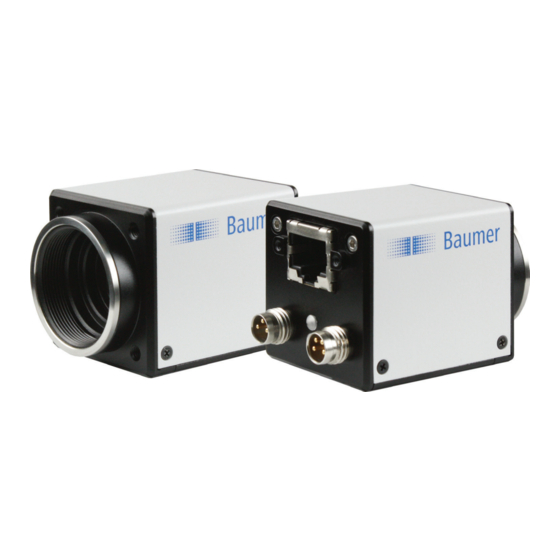- ページ 27
デジタルカメラ Baumer EXGのPDF ユーザーマニュアルをオンラインで閲覧またはダウンロードできます。Baumer EXG 42 ページ。 Gigabit ethernet

5. Interface Functionalities
5.1 Device Information
This Gigabit Ethernet-specific information on the device is part of the Discovery-Acknowl-
edge of the camera.
Included information:
▪ MAC address
▪ Current IP configuration (persistent IP / DHCP / LLA)
▪ Current IP parameters (IP address, subnet mask, gateway)
▪ Manufacturer's name
▪ Manufacturer-specific information
▪ Device version
▪ Serial number
▪ User-defined name (user programmable string)
5.2 Packet Size and Maximum Transmission Unit (MTU)
Network packets can be of different sizes. The size depends on the network components
employed. When using GigE Vision
to use larger packets. On the one hand the overhead per packet is smaller, on the other
hand larger packets cause less CPU load.
The packet size of UDP packets can differ from 576 Bytes up to the MTU.
The MTU describes the maximal packet size which can be handled by all network com-
ponents involved.
In principle modern network hardware supports a packet size of 1500 Byte, which is
specified in the network standard. However, so-called "Jumboframes" are on the advance
as Gigabit Ethernet continues to spread. "Jumboframes" merely characterizes a packet
size exceeding 1500 Bytes.
Baumer EXG cameras can handle a MTU of up to 65535 Bytes.
5.3 Inter Packet Gap
To achieve optimal results in image transfer, several Ethernet-specific factors need to be
considered when using Baumer EXG cameras.
Upon starting the image transfer of a camera, the data packets are transferred at maxi-
mum transfer speed (1 Gbit/sec). In accordance with the network standard, Baumer em-
ploys a minimal separation of 12 Bytes between two packets. This separation is called
"inter packet gap" (IPG). In addition to the minimal IPG, the GigE Vision
lates that the IPG be scalable (user-defined).
- compliant devices, it is generally recommended
®
IPG:
The IPG is measured in
ticks (described in chapter
5.2).
An easy rule of thumb is:
1 Tick is equivalent to 4
Bytes of data.
standard stipu-
®
You should also not forget
to add the various ethernet
headers to your calculation.
27
